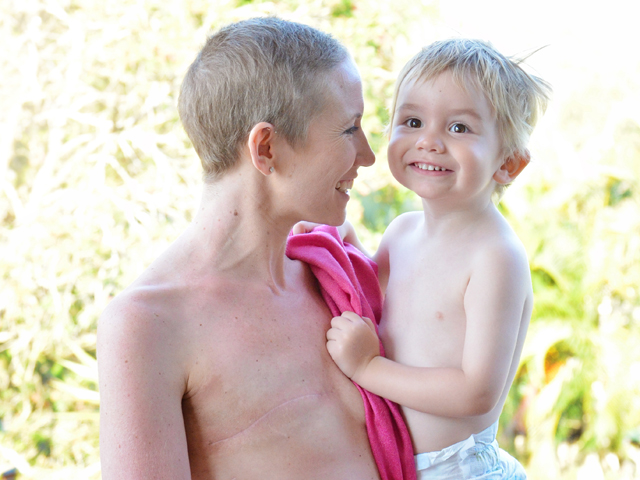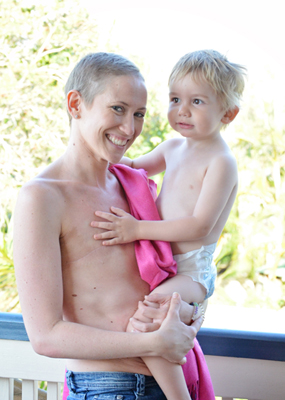Tarah Hastie NBCF Interview

Zero Breast Cancer Deaths by 2030
The National Breast Cancer Foundation (NBCF) has marked the new decade and the commencement of the 10-year countdown to their ambitious goal of Zero Deaths by 2030, launching recommended research investment roadmap which outlines key areas they believe will have the biggest impact to stopping deaths over the next 10 years.
Breast cancer is the most commonly diagnosed cancer in Australia and 1 in 7 women will be diagnosed in their lifetime (up from 1 in 8 just last year) - almost 20,000 will be diagnosed this year alone. Although Australia has a 91% survival rate (largely thanks to research), 9% of those diagnosed still die within five years - which equates to 8 deaths per day or over 3,000 per year. NBCF has identified the research areas which need to be addressed if we are to reach zero deaths from breast cancer by 2030, which will require investment of more than $100 million:
Gap analysis – A full and comprehensive dataset analysis between medical facilities and clinics that link patient information in Australia will identify why some patients with breast cancer don't live past the five-year survival rate. Insights from this analysis will help to inform research investment into the highest priority areas helping to improve survival rates.
Immunotherapies – An emerging area of research that aims to enhance the immune system to kill cancer cells in the body.
Precision medicine – Treatment is evolving towards more personalised therapies. These medicines aim to target each individual tumour to get the best treatment outcomes.
Predictive testing and prevention – 1 in 4 breast cancers are potentially preventable. Improving diagnostics and screening programs, reducing breast cancer recurrence and a deeper understanding of risk factors will enable great preventative options.
Professor Sarah Hosking, CEO National Breast Cancer Foundation Australia, said "2020 marks a significant milestone for NBCF as we start our 10-year countdown towards 2030 and our target of a world without breast cancer deaths. No-one should have to lose a loved one to this devastating disease and we are working tirelessly to change Australia's future for the better. Our research investments are made with a focus on our goal of zero deaths by 2030 and are guided by Australia's leading breast cancer researchers and clinicians, as well as people affected by breast cancer."
The National Breast Cancer Foundation has begun funding Professor David Roder from the University of South Australia, in addition to already funding projects in the areas identified above. He will lead a gap analysis project across the country.
"There is currently no data coordination between medical facilities and clinics that link patient information, tumour characteristics and outcomes for breast cancer. This means it is hard to find who is most at risk of dying from the disease. Professor David Roder has already started the first step of the pathway and is currently collating datasets from hospitals and clinics across Australia to identify factors like location demographics or socioeconomic conditions which can impact survival outcomes," Professor Hosking added.
"In order to find the individuals with a higher mortality rate we need to understand who they are, where they come from and how they live. This information will help to provide actions to improve health service delivery to those who need it most and make survival something that is accessible to all."
The news comes as eminent Australian designer Camilla Franks published a heartfelt letter to her future self about the need for investment in breast cancer research. The designer was diagnosed with stage three breast cancer in 2018 and had chemotherapy, a double mastectomy and breast reconstruction. She is now on the road to recovery from the disease.
"In 2020, we still lose 8 women to breast cancer every day. That's 8 too many," said Franks.
"This is a reality that women shouldn't have to face, and the time is now to fight this fight for good. With every fibre of my being, I write this letter with the hope that in 2030 there are no victims, no survivors – just no breast cancer deaths at all."

Interview with Tarah Hastie
At 27, with a 19-month-old son, Tarah heard the words no woman wants to hear: "Your results came back and it appears you have breast cancer." She remembers feeling like her world was crashing down around her. As she was young Tarah didn't expect the prognosis to be so severe – but after meeting with her breast surgeon and hearing that based on the tumour alone, regardless of whether cancer had spread, she would need a mastectomy, chemotherapy, radiation, and hormone therapy – she was hit with the enormity of her situation as she realised her scary prognosis was a life-threatening disease. Tarah began drafting letters and filming video diaries for her son, Chester, and her husband, Adam, so she could be with them on birthdays, for his first day of school, and to help Adam navigate raising their son alone.
Tarah's specialists did everything in their power to let her see her son grow up, and five years later, she did what had previously seemed impossible – she fell pregnant with her second child – a baby girl, Valerie. Now eight years in remission, Tarah has made it her mission to tell everyone and anyone about the importance of breast care and breast awareness so that her daughter won't have to face the anxiety, fear, and worry that she faced as a young woman.
Question: Are you able to take us back to the time when you were told you had breast cancer?
Tarah Hastie: I was 27 years old. I had just returned back to Australia with my husband and 18-month-old son after living overseas. We were in the midst of getting our lives in Australia back on track. When I found the lump, I truly never entertained the thought that it might have been cancer. I hadn't heard of anyone getting breast cancer before their 40's. When I was told it was Breast Cancer, it truly shocked my world, because you never think something like this will happen to you – until it does. My thoughts were straight to my son and wanting to know if I would be here to see him grow up. It was fear like I had never felt before because no one could tell me with certainty what my future held.
Question: What treatment did you have for your breast cancer?
Tarah Hastie: I had a Mastectomy to my right breast and an auxiliary clearance (where they remove your lymph nodes from your underarm and chest) because my cancer had spread to my lymph nodes. I had eight rounds of chemo - four of AC (Adriamycin cyclophosphamide) and then four of Taxol. After chemo, I had a month of radiation and then commenced Tamoxifen for two years (an estrogen receptor modulator because my cancer was estrogen fueled). In 2014 I chose to have my other breast removed.
Question: How difficult was it to drafting letters and film videos for your family, at this time?
Tarah Hastie: It was unlike anything I have ever experienced. You start reflecting on your life, your choices and your relationships. It made me long to have my time again because time is never enough. I was only a new mother and I wanted to experience so much more. I worried for my husband who felt so helpless that he couldn't "fix" me. I wanted them to still have a connection to me even if I wasn't there- so they were always in my mind.
Question: How does this difficult time, affect you now, eight years in remission?
Question: How does it feel to hear NBCF have announced a world without breast cancer deaths is achievable by 2030?
Tarah Hastie: I have been involved with NBCF since 2012. When I started one in nine women were diagnosed with breast cancer in their lifetime. In 2020, that figure is now one in seven. It is the most commonly diagnosed cancer in Australia so more than ever, this goal (which was once aspirational) being achievable is incredible. Since being in remission I gave birth to a daughter (in 2017) and it motivates me even more to support the amazing efforts of NBCF to ensure she won't ever feel the fear and uncertainty I did regarding this disease.
Question: What advice do you have for other young women recently diagnosed with breast cancer?
Tarah Hastie: Talk to other women. Gain inspiration from their stories and experiences. You may feel like you don't have control over your body or your future, but you have control over how you fight this disease. NBCF is determined to have zero deaths from Breast Cancer in the next decade so keep positive and look to the future. You aren't alone in this.
Interview by Brooke Hunter
MORE



